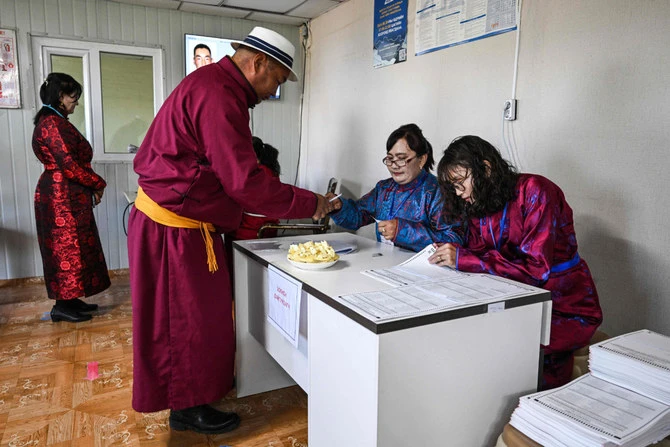Mongolians vote as anger grows over corruption and economy

Stay tuned with 24 News HD Android App

Mongolians voted in parliamentary elections on Friday, with the ruling party widely expected to win despite deepening public anger over corruption and the state of the economy.
People across the vast, sparsely populated nation of 3.4 million, sandwiched between China and Russia, were voting to elect 126 members of the State Great Khural.
Polls opened at 7 am local time and closed at 10 pm (1400 GMT), an AFP reporter at a polling station in the capital Ulaanbaatar said.
Tsagaantsooj Dulamsuren, a 36-year-old cashier pregnant with her fourth child, told AFP that Friday's poll offered her a chance to "give power to the candidates you really want to support".
"I want lawmakers to provide more infrastructure development... and more jobs in the manufacturing industry for young people," she said outside a polling station at a hospital near the capital Ulaanbaatar.
Analysts expect the ruling Mongolian People's Party (MPP), led by Prime Minister Luvsannamsrain Oyun-Erdene, to retain the majority it has enjoyed since 2016 and govern the country for another four years.
They say the party can credit much of its success to a bonanza over the past decade in coal mining that fuelled double-digit growth and dramatically improved standards of living, as well as a formidable party machine and a weak, fractured opposition.
Yet there is deep public frustration over endemic corruption, as well as the high cost of living and lack of opportunities for young people who make up almost two-thirds of the population.
There is also a widespread belief that the proceeds of the coal-mining boom are being hoarded by a wealthy elite -- a view that has sparked frequent protests.
Broad spectrum
Preliminary results are expected to come within a few hours of polls closing despite Mongolia's vast size, thanks to assistance from automated vote counting.
The streets of Ulaanbaatar, home to almost half the population, have been decked out with colourful campaign posters touting candidates from across the political spectrum, from populist businessmen to nationalists, environmentalists and socialists.
Parties are required by law to ensure that 30 percent of their candidates are women in a country where politics is dominated by men.
Long lines snaked around corridors at a polling station in a school in downtown Ulaanbaatar, with many voters wearing traditional clothing.
Oyun-Erdene also voted in a kindergarten in Ulaanbaatar, an AFP reporter saw.
The prime minister told local TV after casting his ballot that he hoped Friday's vote would "open a new page of trust and cooperation between the state and citizens".
However, many younger, urban voters are not convinced by the MPP's pitch, while the failure of the established opposition Democratic Party to provide a credible alternative has helped fuel the rise of minor parties.
Batsaikan Battseren, a 45-year-old community leader dressed in traditional Mongolian deel clothing, said he was urging people to vote.
"Our area's average participation is 60 percent," the former herder said at a polling station in rural Sergelen, an administrative division more than an hour's drive from the capital.
However, "young people from 18 to 30 years old don't go to vote", he said.
'Social contract'
Mongolia has plummeted in Transparency International's Corruption Perceptions Index under Oyun-Erdene's premiership.
It has also fallen in press freedom rankings and campaigners say there has been a notable decline in the rule of law.
Some fear that, should it win a new mandate, the ruling party will tighten Oyun-Erdene's grip on power and erode the democratic freedoms of ordinary Mongolians.
"I'll describe this election as a referendum on... Prime Minister Oyun-Erdene and whether he will manage to get a mandate to rewrite Mongolia's social contract," Bayarlkhagva Munkhnaran, political analyst and former adviser on the National Security Council of Mongolia, told AFP.
The MPP is the successor to the communist party that ruled Mongolia with an iron grip for almost 70 years.
It remains popular, particularly among rural, older voters, and commands a sprawling, nationwide campaign apparatus.
"Their appeal is 'look, we've done well, we've managed well'," Julian Dierkes, a professor at the University of British Columbia and an expert on Mongolian politics, told AFP.
He said concern about corruption was widespread, even though "there's no real distinction" among the opposition parties.
"The extent to which that'll resonate with voters, we'll know tonight sometime. It's really hard to guess," Dierkes said.
